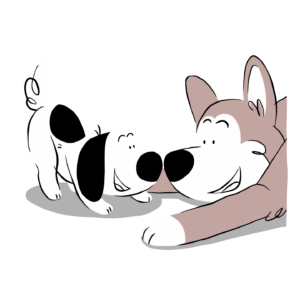Pets and Their People Blog
What You Need to Know About Puppy Socialization
Socialization is a hot topic, but what does it mean exactly?
Is it about your pet being able to play and being social? Well kinda, but not just that.
Dogs and cats have a critical socialization period; in puppies this is a period of 3-12 weeks of age, and in kittens their key socialization period is up to 7 weeks of age.
During these periods our pets are most receptive to new experiences, and the things they are exposed to -or not- can have far reaching consequences. That’s not to say they can’t still learn after their socialization period, but the work you do will be more remedial, and you’ll need to work hard at teaching them that the world isn’t a scary place, and that new experiences are fun.
Socialization vs Habituation

We tend to lump these two topics together. When in fact, they’re quite different. Socialization is about positively exposing your pet to people, and other animals, whereas habituation refers to nonliving things like surfaces, sounds, and environments.
A puppy who is well-habituated will be comfortable around the noise of cars, washing machines, vacuum cleaners and other sights and sounds of everyday life.
A puppy who is well-socialized will not only be confident but also polite in public.
Socialization Isn’t Flooding
When it comes to socializing a puppy, there’s a temptation to ‘pass the puppy’ and get them to meet tons of people and tons of dogs all at once, but there’s a very real danger of overloading a dog with too many experiences, so it needs to be done methodically, with you watching your pup’s body language to see what they’re saying.
Body language can tell you a lot about how a puppy is feeling. And if they’re scared of something, there’s no point in ‘showing them that it’s safe,’ because you’re just showing them the thing they’re afraid of up close, which is unlikely to make them less fearful and will often scare them more.
Should I Attend Puppy Socialization Classes?
We think so; puppy socialization classes not only expose your puppy in a controlled way to other dogs (puppies) and people, but you also get real time feedback from a professional dog trainer who can help you read your puppy’s body language and teach you essential life skills or manners training with your puppy.
Many puppy socialization classes will cover people who look different, surfaces, and noises in a way that does not overwhelm or flood your puppy, and attending classes has helped many a shy puppy build confidence week after week.
What About Kitten Socialization?
Kitten socialization classes do exist, but due to the much smaller socialization window, it is sometimes more practical for kittens to be socialized by the shelter/rescue organization, foster family, or breeder. That gives them the best chance to grow into well-adjusted and confident cats.
If you want to do fun activities with your cat, try clicker training! It is great for stretching their brains, and growing their confidence. It also has great real-life applications like cat carrier and vet visit training without stress.
Finally, Here Are Our Top Tips for a Well-Socialized Puppy:
- Start early – Get your puppy out and about in a pouch or stroller to show them the world safely prior to full vaccination.
- Stay positive – Your puppy looks to you for guidance about situations, so be confident and upbeat.
- Keep sessions short – The outside world can be overwhelming and exhausting, so do sessions little and often.
- Go at your puppy’s pace – Don’t force them into situations. Do allow them to approach people without being grabbed or picked up.
- Use treats – The smellier the better: wet food in a food tube, liver paste or dried sprats will do wonders at building positive associations. Just let them have a lick or nibble now and again.
- Use novelty in different ways – Puzzle toys, chews, and mental enrichment will all help your puppy feel positive about new things.
Our biggest tip is to enjoy your kitten or puppy. They’re not little for long, so have fun!
Here’s to positive early life experiences and raising a confident pet.
About the Author
Petrina Firth is a Dog Trainer and Certified Animal Behaviorist of over 10 years who now mainly specializes in Separation Anxiety (CSAT) and also creates content, lessons and articles for the Zigzag puppy training app and website. Petrina is a member of the Pet Professional Guild, the head of marketing and board member for the APDT UK, and a member of the CAPBT committee. She is also a tech and gadget enthusiast who enjoys city living with her rescue French Bulldog and partner.
Zigzag* is a puppy training app with a difference, rather than focusing solely on obedience we take puppy guardians on a journey through Life Skills and important developmental stages, to hopefully give them happy, confident and well-behaved puppies, with an understanding that puppies and dogs aren’t robots, they have big feelings, and that’s ok!
* Available in the UK and coming soon to the US.
Zigzag is a Pet Professional Guild Corporate Partner.


